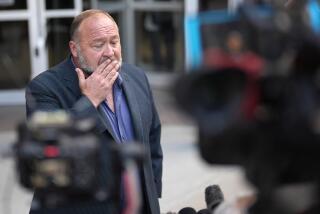New Smith Financial Statement Approved by Bankruptcy Judge
- Share via
LOS ANGELES — Smith International Inc.’s plan to emerge from bankruptcy by the end of the year surged forward Monday when a federal bankruptcy judge approved the Newport Beach oil services company’s revised financial disclosure statement.
Approval of the statement by U.S. Bankruptcy Judge James R. Dooley is a major step in the company’s bankruptcy reorganization plan.
Attorneys representing two groups of unhappy Smith creditors asked Dooley to delay the hearing until they received more information, but the judge overruled their objections and approved the document.
“This is good news,” said Smith Chairman and President Jerry Neely after attending the hearing. “It’s part of the hard work that went into this consensual agreement.”
Most of Smith’s creditors--including its largest, Baker Hughes Inc. of Houston--have gone on record in support of Smith’s reorganization.
Smith filed for protection under Chapter 11 of the federal bankruptcy code in March, 1986, shortly after a Los Angeles federal judge ruled that Smith had to pay Hughes $205 million to settle a 15-year-old patent infringement lawsuit.
In June, Hughes Tool Co., which merged with Baker International Inc. earlier this year, agreed to accept $95 million to settle the case on the condition that it receive payment by Dec. 31, 1987.
“Delay in this case is a disaster,” said Daniel Lewis, an attorney representing Baker Hughes. Lewis told Dooley that Baker Hughes could withdraw its $95 million settlement agreement and demand the full $205 million from Smith if the bankruptcy proceedings were delayed.
Meanwhile, Ronald Leibow, an attorney representing several Smith debt holders, said his clients will continue to object to Smith’s reorganization, despite the judge’s approval of the disclosure statement.
“It’s only the beginning,” said Leibow, who said he represents individuals and institutions who hold about $64 million of Smith debt.
Leibow told Dooley that his clients do not believe that they will receive 100 cents on the the dollar, as Smith says they will, when the company’s creditors are paid.
Leibow declined to say what legal action he planned to take, but an associate said the objecting creditors can appeal the judge’s ruling and continue to raise objections before and during the bankruptcy confirmation hearings scheduled for November.
Marcia Goldstein, an attorney for the New York brokerage and investment firm of Herzog, Heine & Geduld, said her client believes Smith “might have misled” its creditors by promising to make full payment.
She said Herzog holds about $45 million in Smith debt.
Smith’s bankruptcy attorney, Richard Broude, said Smith will prove that creditors will receive 100 cents on the dollar during the November confirmation hearings. Broude also noted that the U.S. Bankruptcy Court trustee assigned to the case said Smith’s disclosure statement was adequate.
David Levine, an attorney representing a committee of stockholders who support the reorganization, said the objecting creditors are “exerting leverage” in a bid to increase the amount of money or stock they receive, at the expense of the other creditors.
A Smith official who asked not to be identified said the objecting creditors already stand to earn more than a 40% return on the debt instruments that they purchased. Attorneys for Smith, the shareholder committee and the unsecured creditors’ committee all criticized the objections raised by Leibow and Goldstein and urged Dooley to approve the disclosure statement.
“We believe the (reorganization) plan to be fair and equitable,” said Bernard Shapiro, an attorney representing the unsecured creditors’ committee.
According to Loren Carroll, Smith’s chief financial officer, the current reorganization calls for the distribution of $85 million in cash and $10 million in notes to Baker Hughes.
Other secured and unsecured creditors would receive $71 million in cash, $90 million in Class A notes at a 12.5% fixed interest rate, $45 million in Class B notes at a floating interest rate of 2% over the prime rate, $19 million in preferred stock and $54.5 million in common stock.
More to Read
Inside the business of entertainment
The Wide Shot brings you news, analysis and insights on everything from streaming wars to production — and what it all means for the future.
You may occasionally receive promotional content from the Los Angeles Times.










